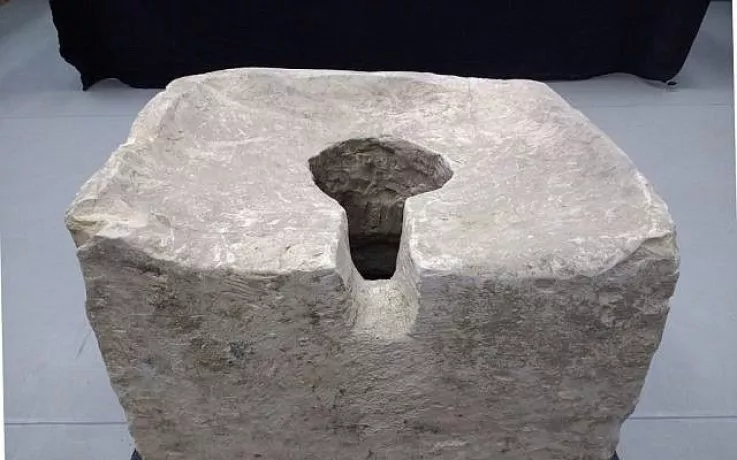Ahanu
Well-Known Member
- Messages
- 2,128
- Reaction score
- 526
- Points
- 108
Here is an interview with an atheist named Francesca Stavrakopoulou I found informative. The discussion here involved Old Testament stories and the broader culture they were written in. The gist of the discussion is that the beliefs and ideas in the Old Testament are not unique.
One discussion I found hilarious was the reference to idols as s*** gods, and so I had to share it! While looking up this biblical reference I was amused with the variations in translations here. The TLB and CEV seem to be closest to the literal translation.
At noon Elijah mocked them. He said, “Shout loudly, for he’s a god! Maybe he’s thinking it over; maybe he has wandered away; or maybe he’s on the road. Perhaps he’s sleeping and will wake up!” They shouted loudly, and cut themselves with knives and spears, according to their custom, until blood gushed over them.
-1 Kings 18.27-28, HCSB
At noon, Elijah began making fun of them. “Pray louder!” he said. “Baal must be a god. Maybe he's daydreaming or using the toilet or traveling somewhere. Or maybe he's asleep, and you have to wake him up.
-1 Kings 18.27, CEV
About noontime, Elijah began mocking them. “You’ll have to shout louder than that,” he scoffed, “to catch the attention of your god! Perhaps he is talking to someone, or is out sitting on the toilet, or maybe he is away on a trip, or is asleep and needs to be wakened!
-1 Kings 18.27, TLB
At noon Elijah began to taunt them. “Shout louder!” he said. “Surely he is a god! Perhaps he is deep in thought, or busy, or traveling. Maybe he is sleeping and must be awakened.”
-1 Kings 18.27, NIV
At noon Elijah began to tease them. “Shout louder!” he said. “I’m sure Baal is a god! Perhaps he has too much to think about. Or maybe he has gone to the toilet. Or perhaps he’s away on a trip. Maybe he’s sleeping. You might have to wake him up.”
-1 Kings 18.27, NIRV
By noon, Elijah had started making fun of them, taunting, “Call a little louder—he is a god, after all. Maybe he’s off meditating somewhere or other, or maybe he’s gotten involved in a project, or maybe he’s on vacation. You don’t suppose he’s overslept, do you, and needs to be waked up?” They prayed louder and louder, cutting themselves with swords and knives—a ritual common to them—until they were covered with blood.
-1 Kings 18.27, MSG
One discussion I found hilarious was the reference to idols as s*** gods, and so I had to share it! While looking up this biblical reference I was amused with the variations in translations here. The TLB and CEV seem to be closest to the literal translation.
At noon Elijah mocked them. He said, “Shout loudly, for he’s a god! Maybe he’s thinking it over; maybe he has wandered away; or maybe he’s on the road. Perhaps he’s sleeping and will wake up!” They shouted loudly, and cut themselves with knives and spears, according to their custom, until blood gushed over them.
-1 Kings 18.27-28, HCSB
At noon, Elijah began making fun of them. “Pray louder!” he said. “Baal must be a god. Maybe he's daydreaming or using the toilet or traveling somewhere. Or maybe he's asleep, and you have to wake him up.
-1 Kings 18.27, CEV
About noontime, Elijah began mocking them. “You’ll have to shout louder than that,” he scoffed, “to catch the attention of your god! Perhaps he is talking to someone, or is out sitting on the toilet, or maybe he is away on a trip, or is asleep and needs to be wakened!
-1 Kings 18.27, TLB
At noon Elijah began to taunt them. “Shout louder!” he said. “Surely he is a god! Perhaps he is deep in thought, or busy, or traveling. Maybe he is sleeping and must be awakened.”
-1 Kings 18.27, NIV
At noon Elijah began to tease them. “Shout louder!” he said. “I’m sure Baal is a god! Perhaps he has too much to think about. Or maybe he has gone to the toilet. Or perhaps he’s away on a trip. Maybe he’s sleeping. You might have to wake him up.”
-1 Kings 18.27, NIRV
By noon, Elijah had started making fun of them, taunting, “Call a little louder—he is a god, after all. Maybe he’s off meditating somewhere or other, or maybe he’s gotten involved in a project, or maybe he’s on vacation. You don’t suppose he’s overslept, do you, and needs to be waked up?” They prayed louder and louder, cutting themselves with swords and knives—a ritual common to them—until they were covered with blood.
-1 Kings 18.27, MSG
Last edited:

